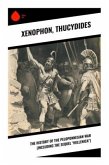Xenophon's "Cyropaedia," or "The Education of Cyrus," is a seminal work that intertwines biography, history, and philosophical discourse, presenting the life of Cyrus the Great as an archetype of virtuous leadership and governance. Written in a sophisticated yet accessible prose, the text explores themes of power, ethics, and the ideal ruler through a blend of narrative storytelling and didactic commentary. Set in the context of the Persian Empire, Xenophon artfully captures the complexities of empire, duty, and the cultivation of piety and wisdom, offering insights into ancient political theory and the moral responsibilities of leadership. Xenophon, an Athenian historian, soldier, and philosopher, drew upon his experiences both as a student of Socratic thought and as a mercenary in Persia to craft this influential text. His unique perspective, blending historical fidelity with allegorical elements, reflects his desires to understand and communicate the principles of effective leadership amidst the tumultuous political landscapes of his time. His admiration for Cyrus's character and achievements underscores the text's dual function as both a historical account and a philosophical treatise. "Cyropaedia" is essential reading for anyone interested in the intersections of history, philosophy, and political science. It not only illuminates the life of an extraordinary figure but also offers timeless wisdom on the nature of leadership and governance. Whether you're a student of ancient history or a contemporary leader, Xenophon's insights remain profoundly relevant, encouraging readers to reflect on the qualities that define true greatness.
Bitte wählen Sie Ihr Anliegen aus.
Rechnungen
Retourenschein anfordern
Bestellstatus
Storno








